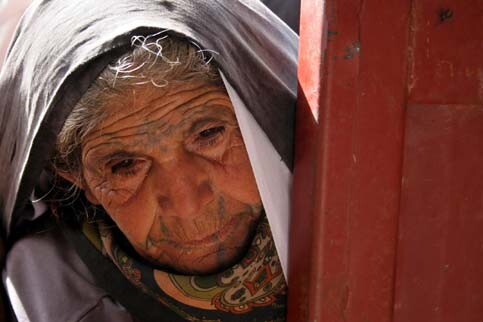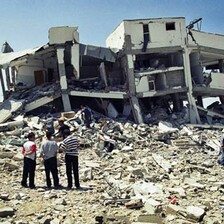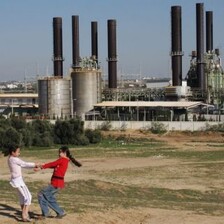The Electronic Intifada 6 May 2006

Palestinians receive their monthly food supplies from the UN Relief and Works Agency, (UNRWA), at a warehouse in the Rafah Refugee Camp in the southern Gaza Strip April 19, 2006. Agencies have warned the Israeli Foreign Ministry that the Gaza Strip is on the verge of a humanitarian crisis. (MaanImages/Hatem Omar)
With Hamas in control of the Palestinian Authority (PA) government, and Western donors are halting all direct aid to it, an already precarious humanitarian situation in the West Bank and Gaza could potentially turn worse.
Virtually bankrupt, the PA needs $120 million a month to pay its staff, and an additional $40 million for continued minimum basic services to its constituency. With Israel suspending the transfer of $60 million a month in Palestinian customs receipts, the $35 million the PA collects each month in domestic revenues are not enough to keep it afloat. If financial squeeze persists, it could lead to PA institutional collapse and trigger an unprecedented humanitarian crisis in the Palestinian areas.
Failure to pay salaries would leave close to 160,000 PA workers, and over million other Palestinians supported by them û or about 25 percent of the population - with no means to subsist. And when alternative jobs are virtually non-existent, and over one third of the Palestinian workforce is already jobless, it could get real bad. Worse yet, in today’s increasingly lawless PA, where maintaining law and order comes in a close tie with the need for jobs as the population top priority, leaving 70,000 armed security men penniless could be catastrophic.
Educational and health services, mostly run by the PA, could also breakdown due to abrupt lack of financial resources. The repercussions of letting tens of thousands of Palestinian school kids in the streets because their teachers are not paid or their classrooms are no longer open, or denying essential health care services to a destitute population where over 50 percent live on less than $2 a day, are devastating to say the least. The overall mental and physical health of the Palestinian people could also be it risk, seriously undermining the viability of the future Palestinian state; a long term stated goal of the international community.
The fallout on the battered Palestinian economy, which has already lost one third of its output since the eruption of violence in September 2000, and continues to operate under an increasingly stiffening restrictions by Israel, is no less damaging and could equally be destructive.
Curtailment of Western development aid not only deprives the Palestinian population of vital infrastructure services in water, roads, sewage and the like, but is almost certain to hit hard the construction sector and all business activities linked to it. Small businesses in the West Bank and Gaza, representing over 80 percent of the Palestinian economy, could crumple due to sharp drop in domestic demand and customers defaults on outstanding debts, both precipitated by PA financial crisis. The Palestinian banking sector which has survived adverse conditions in recent past, and is currently under mounting pressure not to deal with Hamas-led government, could face serious trouble if PA and other local businesses fail to honor debt obligations, leading banks to tighten credit policy, thus further straining the economy.
In their attempt to bypass Hamas-led government, Western donors are considering UN agencies and international NGOs as alternative channels in delivering humanitarian assistance. In reality, however, this may prove both costly and problematic.
To begin with, this approach is bound to undermine the Palestinian public institutions that donors themselves helped to create since 1994. It may also be difficult to sidestep the new government, since all aspects of aid cycle, at one stage or another, have to go through official bureaucracy. The criteria of what is permissible and what is not could be a tedious exercise and may needlessly complicate aid delivery at times where the need for assistance is immense.
Furthermore, avoiding cooperation with Hamas-led government at time of actual crisis may not be possible altogether. In crisis circumstances, governments usually see as their first job to help the population cope with the situation, including coordinating various efforts where outsiders are involved. Hamas, with its long experience in this field, will tend to lead and not to leave the task to others.
Finally, UN agencies and foreign NGOs operating in Palestine may not have the extra capacity, or the mandate, to provide services in areas traditionally covered by the PA government. Their ability to function could become even more complicated if worsening humanitarian conditions lead to internal chaos, rise in lawlessness, and, consequently, an increase in Israeli restrictions on access and movement.
The potential gravity of the humanitarian crisis in the PA areas has already caused some alarm bells ringing loud. A UN report last month (April 11th) has confirmed what a World Bank report a month before (March 15th) projected to happen in 2006 alone if PA money crunch and Israeli restrictions on movement continue: a 25 percent drop in Palestinian GDP, with both unemployment and poverty rates, respectively, reaching 40 and 67 percent of the Palestinian workforce and population.
With so much at stake, there is an urgent need for action. Politics aside, there are many practical ways where international aid can still be delivered, Palestinian costumes revenues be transferred, and restrictions on movement of Palestinian people and trade be eased; all this without necessarily undermining neither the free electoral choice of the Palestinian people, nor the concerns of the Western donors or Israel.
Conditions are quickly deteriorating in the West Bank and Gaza, and all parties, including the Palestinians themselves, share responsibility to defuse what could potentially be an unprecedented humanitarian crisis with unforeseen adverse political and security consequences.
Mohammed El-Samhouri is a Gaza-based Palestinian economist and a former economic adviser to the minister of planning and the minister of foreign affairs in the Palestinian Authority. He can be reached at msamhouri@yahoo.com.
Related Links


